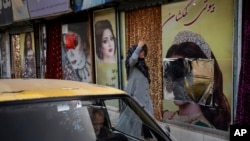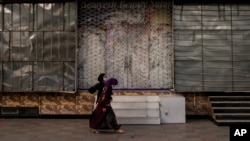A few weeks after the fall of Kabul in August 2021, a group of armed Taliban entered Henna Beauty Salon and assured the staff they could continue their work.
“The Taliban said, ‘We don’t have any problem with you since there are no men, and you can continue what you do without any problem,’” Athena Hashemi, owner of the salon, remembered.
But last week, the Taliban Ministry of Vice and Virtue sent a letter to the salon’s branches in Mazar-i-Sharif and Kabul telling them to close in a month.
In a video statement last week, Sadiq Akif Mahjer, spokesperson for the Ministry of Virtue and Vice, said that the services offered by the salons such as shaping eyebrows, hair extensions and makeup, were “forbidden by Islam,” adding that the salons caused economic hardships for the prospective grooms’ families, who pay for the salon visits of the bride and her female relatives for hairdos and makeup.
Since returning to power in 2021, the Taliban have issued several decrees restricting women’s rights in Afghanistan.
Women are not allowed to get secondary and university educations, travel long distances without male companions, work with the government or nongovernmental organizations, or go to parks, public baths and gyms.
Hashemi and her staff continued to work despite the restrictions, but the Taliban’s sudden decision to close women’s beauty salons shocked her.
As a pioneer businesswoman, Hashemi opened her salon in 2013, offering beauty and wellness services to women in Kabul.
‘Devastating consequences’
The Taliban's recent decision is “an attack on women’s ability to participate in the private sector,” said Heather Barr, associate director of the Women’s Rights Division at Human Rights Watch.
“The Taliban has already shut women out of most government jobs and NGO jobs. But they’ve been more tolerant of women working in the private sector, and this could be a sign that, too, is ending with devastating consequences,” Barr said.
She added that beauty salons were the only spaces offering “community support to women in a situation where they’ve already lost many other sources of support.”
Rina Amiri, U.S. special envoy for Afghan women, girls and human rights, said the ban was concerning.
“The Taliban ban on beauty parlors removes another vital space for women’s work at a time when they’re struggling to feed their families, eliminates one of the few refuges for women outside the home & further transforms the country into a cruel & extreme outlier in the world,” she said in a tweet.
Hosay Andar, a former board member of Afghanistan’s Chamber of Commerce and Investment, said the Taliban’s decision to close beauty salons would harm the women and Afghanistan’s economy.
“First, it will affect women, as those working in salons are the only breadwinners.… Second, it would have an impact on the new regime. It is because every beauty salon pays taxes and contributes to the national economy,” Andar said.
The United Nations Assistance Mission in Afghanistan last week urged the Taliban to reconsider the decision.
“This new restriction on women’s rights will impact negatively on the economy & contradicts stated support for women entrepreneurship,” UNAMA said in a tweet last week.
Afghanistan’s Chamber of Commerce and Investment said there are about 12,000 beauty salons in business across the country.
Hashemi said the Taliban’s decision would have an impact on her 75 employees in Kabul and Mazar-i-Sharif.
“It will affect all of us. We will suffer economically and psychologically,” she said.
Waheed Faizi from VOA's Afghan Service contributed to this report, which originated in VOA's Afghan Service.







